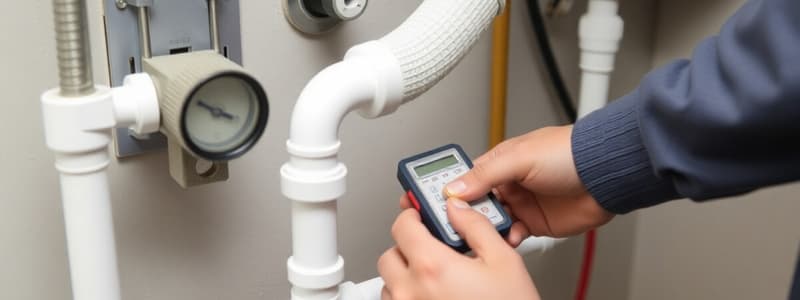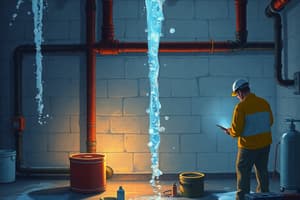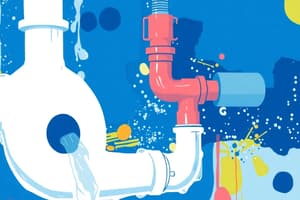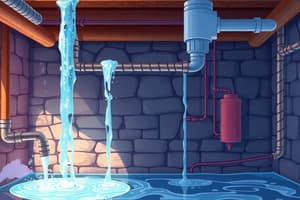Podcast
Questions and Answers
What should be done with pipework that is no longer in use?
What should be done with pipework that is no longer in use?
- Fill the pipework with concrete
- Leave it as it is without any modifications
- Remove and leave the pipework unsealed
- Cap the pipework at the end of branches (correct)
What is a passive dead leg in plumbing?
What is a passive dead leg in plumbing?
- A pipe that delivers hot water without drawing cold water first
- A section of pipework where water cannot be drawn off (correct)
- A section of pipe that allows water flow at all times
- A pipe that is regularly maintained and serviced
Why is it important to label valves after isolation during maintenance?
Why is it important to label valves after isolation during maintenance?
- To keep track of which valves need replacement
- To inform customers about the ongoing work
- To avoid turning on the valve while work is ongoing (correct)
- To prevent unauthorized access to the valves
What is the best practice when draining a cold water system?
What is the best practice when draining a cold water system?
What should you do if you find a leak during testing?
What should you do if you find a leak during testing?
What is the purpose of flushing and disinfecting a system?
What is the purpose of flushing and disinfecting a system?
How can you determine if a drain is connected to the mains sewer?
How can you determine if a drain is connected to the mains sewer?
What type of draining involves isolating parts of the system?
What type of draining involves isolating parts of the system?
What is the first step in soundness testing plastic pipe systems?
What is the first step in soundness testing plastic pipe systems?
What should be used as a disinfectant during the flushing process?
What should be used as a disinfectant during the flushing process?
What must be checked after pumping the system to 1 bar for 45 minutes?
What must be checked after pumping the system to 1 bar for 45 minutes?
What is a consequence of stagnant water in a system?
What is a consequence of stagnant water in a system?
What is the final step in the commissioning process before handing over to the customer?
What is the final step in the commissioning process before handing over to the customer?
During flushing and disinfecting, after adding chlorine, what should be done next?
During flushing and disinfecting, after adding chlorine, what should be done next?
What is the initial step a plumber must perform before conducting a soundness test?
What is the initial step a plumber must perform before conducting a soundness test?
How long should the system be allowed to stand for temperature stabilization during the soundness test?
How long should the system be allowed to stand for temperature stabilization during the soundness test?
Which of the following describes temporary decommissioning?
Which of the following describes temporary decommissioning?
What is a risk at temperatures between 20°C and 46°C in plumbing systems?
What is a risk at temperatures between 20°C and 46°C in plumbing systems?
To what pressure should the system be pumped during the hydraulic testing of a system that operates at 3BAR?
To what pressure should the system be pumped during the hydraulic testing of a system that operates at 3BAR?
What must be checked after the pressure is applied during the soundness test?
What must be checked after the pressure is applied during the soundness test?
What procedure follows after soundness testing and confirming no leaks?
What procedure follows after soundness testing and confirming no leaks?
What type of pipe materials require different soundness tests compared to rigid pipe (copper and steel)?
What type of pipe materials require different soundness tests compared to rigid pipe (copper and steel)?
What is the importance of disinfecting a cold water system before commissioning?
What is the importance of disinfecting a cold water system before commissioning?
What should be done if a pressure drop is detected during the soundness test?
What should be done if a pressure drop is detected during the soundness test?
What is the primary purpose of conducting a soundness test on a cold water system?
What is the primary purpose of conducting a soundness test on a cold water system?
During the soundness test for rigid pipes, how long should the system be left to stabilize temperature?
During the soundness test for rigid pipes, how long should the system be left to stabilize temperature?
What should be the first action when performing a soundness test on plastic pipe systems?
What should be the first action when performing a soundness test on plastic pipe systems?
What must be done after filling the system with water before carrying out the soundness test?
What must be done after filling the system with water before carrying out the soundness test?
Which of the following steps is essential to ensuring effective flushing and disinfecting of a new system?
Which of the following steps is essential to ensuring effective flushing and disinfecting of a new system?
What pressure should a system designed to operate at 3BAR be tested at during the hydraulic soundness test?
What pressure should a system designed to operate at 3BAR be tested at during the hydraulic soundness test?
What is the maximum pressure the system should be maintained at during a soundness test according to standard procedures?
What is the maximum pressure the system should be maintained at during a soundness test according to standard procedures?
Which of the following is not a recommended practice after completing a soundness test?
Which of the following is not a recommended practice after completing a soundness test?
How should a plumber confirm that all joints have been checked before soundness testing?
How should a plumber confirm that all joints have been checked before soundness testing?
What is included in the initial steps before performing any soundness testing?
What is included in the initial steps before performing any soundness testing?
Which of these conditions can lead to bacterial growth in a plumbing system?
Which of these conditions can lead to bacterial growth in a plumbing system?
During decommissioning, what is the primary action taken to halt operation?
During decommissioning, what is the primary action taken to halt operation?
What should be the first step in the commissioning process after installing a cold water system?
What should be the first step in the commissioning process after installing a cold water system?
What is a key reason for testing flow rates at outlets during commissioning?
What is a key reason for testing flow rates at outlets during commissioning?
If a plumbing system shows a pressure drop during the soundness test, what action should be taken?
If a plumbing system shows a pressure drop during the soundness test, what action should be taken?
What factor must be controlled during the flushing process to minimize risks?
What factor must be controlled during the flushing process to minimize risks?
What should be done with the pipework when a whole system is decommissioned?
What should be done with the pipework when a whole system is decommissioned?
What is an active dead leg in plumbing systems?
What is an active dead leg in plumbing systems?
Which of the following describes the best practice for draining a cold water system?
Which of the following describes the best practice for draining a cold water system?
What should be used to temporarily cap pipework during maintenance?
What should be used to temporarily cap pipework during maintenance?
Why is it necessary to inform customers when decommissioning a system?
Why is it necessary to inform customers when decommissioning a system?
How should one verify that a system has properly drained?
How should one verify that a system has properly drained?
What is a consequence of having stagnant water in plumbing systems?
What is a consequence of having stagnant water in plumbing systems?
What is a significant step to take when capping branches of pipework?
What is a significant step to take when capping branches of pipework?
Flashcards
Soundness Test
Soundness Test
A test to ensure the integrity of a plumbing system, typically involving pressurizing the system and checking for pressure loss.
Flushing and Disinfecting
Flushing and Disinfecting
The process of removing debris and contaminants from a newly installed plumbing system to prepare it for safe water distribution.
Commissioning
Commissioning
The final stage of installation where the system is tested and made ready for use.
Bacterial Growth
Bacterial Growth
Signup and view all the flashcards
Legionella
Legionella
Signup and view all the flashcards
Noise
Noise
Signup and view all the flashcards
Decommissioning
Decommissioning
Signup and view all the flashcards
Temporary Decommissioning
Temporary Decommissioning
Signup and view all the flashcards
Visual Inspection
Visual Inspection
Signup and view all the flashcards
Testing for Rigid or Plastic Systems
Testing for Rigid or Plastic Systems
Signup and view all the flashcards
Slowly Fill the System
Slowly Fill the System
Signup and view all the flashcards
Walk Around and Check
Walk Around and Check
Signup and view all the flashcards
Temperature stabilization
Temperature stabilization
Signup and view all the flashcards
Attach the Test Bucket
Attach the Test Bucket
Signup and view all the flashcards
Pressurize the System
Pressurize the System
Signup and view all the flashcards
Dead Leg
Dead Leg
Signup and view all the flashcards
Active Dead Leg
Active Dead Leg
Signup and view all the flashcards
Draining Cold Water Systems
Draining Cold Water Systems
Signup and view all the flashcards
Permanent Decommissioning
Permanent Decommissioning
Signup and view all the flashcards
Partially Draining Systems
Partially Draining Systems
Signup and view all the flashcards
Soundness Test for Rigid Pipe
Soundness Test for Rigid Pipe
Signup and view all the flashcards
Soundness Test for Plastic Pipe
Soundness Test for Plastic Pipe
Signup and view all the flashcards
Flushing Out
Flushing Out
Signup and view all the flashcards
Disinfecting
Disinfecting
Signup and view all the flashcards
Draining a Cold Water System
Draining a Cold Water System
Signup and view all the flashcards
What is a dead leg?
What is a dead leg?
Signup and view all the flashcards
What is an active dead leg?
What is an active dead leg?
Signup and view all the flashcards
What is permanent decommissioning?
What is permanent decommissioning?
Signup and view all the flashcards
What is temporary decommissioning?
What is temporary decommissioning?
Signup and view all the flashcards
What is the best way to drain a cold water system?
What is the best way to drain a cold water system?
Signup and view all the flashcards
What does localized draining involve?
What does localized draining involve?
Signup and view all the flashcards
Why do we flush and disinfect a plumbing system?
Why do we flush and disinfect a plumbing system?
Signup and view all the flashcards
Why do we perform a soundness test on a plumbing system?
Why do we perform a soundness test on a plumbing system?
Signup and view all the flashcards
Study Notes
Key Requirements of Testing and Decommissioning Domestic Cold Water Systems
- The commissioning process for a cold water installation involves several steps: visual inspection, soundness test, flushing, disinfecting, and hand-over to customer.
- Soundness tests vary depending on pipe material (rigid/copper, steel, or plastic).
- Before any tests, plumbing professionals must visually check for open ends, properly soldered and compressed joints, and secured clips.
- Rigid pipe (copper and steel) soundness tests involve slowly filling the system with water, leaving it to stabilize, attaching a hydraulic test bucket, and pumping up to 1.5 times the working pressure (e.g., 4.5 bar if the system works at 3 bar). The system should be monitored for at least one hour for pressure drops.
- Plastic pipe (polybutylene) soundness tests involve slowly filling, checking for leaks, pumping to 1 bar, checking for loss of pressure after 45 minutes, increasing pressure to 1.5 times the working pressure for 15 minutes, checking for pressure loss, and reducing to one-third for another 45 minutes while monitoring for pressure loss.
Flushing and Disinfecting
- After installation, the system must be flushed to remove debris. Flush the system thoroughly at each outlet until no chlorine is present.
- Re-fill the system with water and drain it from the lowest point.
- Open the kitchen tap to run water until debris is no longer present. Repeat this at all outlets.
- Add disinfectant (Sodium Hypochlorite or Chlorine) to the system for at least one hour, as detailed in BS EN 806 standards.
Commissioning
- Ensure the system is completely filled.
- Adjust flow rates at each outlet for cold and warm water (in liters/min or liters/sec).
- Check the pressure at each outlet (in bar).
- Inspect insulation and piping.
- Check and label valves.
- Complete all documentation.
- Hand over the system to the customer.
Decommissioning
- Inform the customer or work colleagues if decommissioning is required.
- Cap the pipework at the end of branches.
- Label valves for isolation and warn against turning them on.
- Drain the water thoroughly at each outlet.
- Verify proper connection of the drain system to the main sewer if necessary. Ensure this connection is verified.
Dead Legs
- Passive dead legs: portions of the pipework through which water cannot flow, potentially leading to bacterial growth.
- Active dead legs: sections requiring cold water drainage before hot water drainage, often leading to water waste.
Draining Cold Water Systems
- Common draining techniques include localised, part, or fully draining.
- Always drain from the lowest point using a drain hose.
- Minimize water waste during maintenance or replacement.
- Isolating parts of the system may be necessary.
- Bung kits can be used for safe drainage.
Soundness Testing (Questions)
- Why are soundness tests necessary? To identify leaks and ensure the integrity of the water system, preventing potential damage and water loss.
- What should be done if a leak is discovered during a test? Isolate the affected section, repair the leak, and retest the system to verify the repair.
Flushing & Disinfecting (Questions)
- Why is it necessary to flush and disinfect the system? To remove debris and contaminants, and ensure the system is safe for use and free of bacterial growth.
Decommissioning (Questions)
- What is temporary decommissioning? A temporary isolation of the system for work or repairs.
- What is permanent decommissioning? Permanent removal of the system or appliance.
- What are the 3 types of draining? Local drainage, partial drainage, and fully draining.
Studying That Suits You
Use AI to generate personalized quizzes and flashcards to suit your learning preferences.
Related Documents
Description
This quiz covers the key requirements for testing and decommissioning domestic cold water systems. It includes steps for commissioning, soundness tests for different pipe materials, and important visual inspections prior to testing. Understand the processes involved to ensure compliance and safety in plumbing installations.




